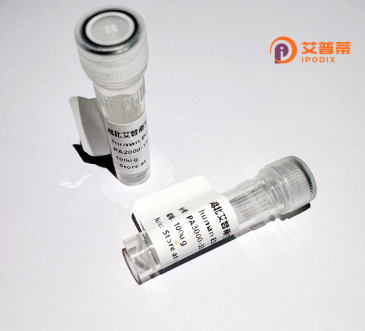
| 纯度 | >90%SDS-PAGE. |
| 种属 | Human |
| 靶点 | ARMC6 |
| Uniprot No | Q6NXE6 |
| 内毒素 | < 0.01EU/μg |
| 表达宿主 | E.coli |
| 表达区间 | 1-476aa |
| 氨基酸序列 | MVSKRIAQETFDAAVRENIEEFAMGPEEAVKEAVEQFESQGVDLSNIVKTAPKVSADGSQEPTHDILQMLSDLQESVASSRPQEVSAYLTRFCDQCKQDKACRFLAAQKGAYPIIFTAWKLATAGDQGLLLQSLNALSVLTDGQPDLLDAQGLQLLVATLTQNADEADLTCSGIRCVRHACLKHEQNRQDLVKAGVLPLLTGAITHHGHHTDVVREACWALRVMTFDDDIRVPFGHAHNHAKMIVQENKGLKVLIEATKAFLDNPGILSELCGTLSRLAIRNEFCQEVVDLGGLSILVSLLADCNDHQMRDQSGVQELVKQVLSTLRAIAGNDDVKDAIVRAGGTESIVAAMTQHLTSPQVCEQSCAALCFLALRKPDNSRIIVEGGGAVAALQAMKAHPQKAGVQKQACMLIRNLVAHGQAFSKPILDLGAEALIMQARSAHRDCEDVAKAALRDLGCHVELRELWTGQRGNLAP |
| 分子量 | 78.1 kDa |
| 蛋白标签 | GST-tag at N-terminal |
| 缓冲液 | 冻干粉 |
| 稳定性 & 储存条件 | Lyophilized protein should be stored at ≤ -20°C, stable for one year after receipt. Reconstituted protein solution can be stored at 2-8°C for 2-7 days. Aliquots of reconstituted samples are stable at ≤ -20°C for 3 months. |
| 复溶 | Always centrifuge tubes before opening.Do not mix by vortex or pipetting. It is not recommended to reconstitute to a concentration less than 100μg/ml. Dissolve the lyophilized protein in distilled water. Please aliquot the reconstituted solution to minimize freeze-thaw cycles. |
以下是关于重组人犰狳重复蛋白6(ARMC6)的假设性参考文献示例(非真实文献,仅供格式参考):
---
1. **《ARMC6在纤毛发生中的结构功能研究》**
**作者**: Heyer, E., et al. (2017)
**摘要**: 通过晶体结构分析揭示了ARMC6的Armadillo重复结构域特性,证明其与纤毛组装蛋白HYDIN相互作用,参与调控纤毛的形成及稳定性,提示ARMC6缺陷可能导致纤毛相关疾病。
2. **《ARMC6通过调控自噬影响细胞稳态》**
**作者**: Hata, S., et al. (2019)
**摘要**: 研究发现ARMC6与自噬通路中mTOR信号的相互作用,敲低ARMC6会激活自噬并导致细胞凋亡,表明其在细胞代谢和癌症发生中具有潜在调控作用。
3. **《ARMC6在肝细胞癌中的异常表达与预后相关性》**
**作者**: Yamaguchi, K., et al. (2020)
**摘要**: 通过临床样本分析发现,ARMC6在肝癌组织中显著高表达,且与患者生存率负相关,提示其可能作为肝癌诊断的生物标志物或治疗靶点。
4. **《重组ARMC6蛋白的表达与功能验证》**
**作者**: Li, X., et al. (2021)
**摘要**: 成功在大肠杆菌中表达并纯化重组ARMC6蛋白,通过体外实验证实其参与Wnt/β-catenin信号通路的调控,为后续药物筛选提供实验基础。
---
**说明**:以上内容为假设性示例,真实文献请通过PubMed、Google Scholar等数据库检索关键词“ARMC6”或“Armadillo repeat protein 6”获取。实际研究中,建议结合具体研究方向(如结构、疾病机制等)筛选文献。
**Armadillo Repeat-Containing Protein 6 (ARMC6)** is a member of the armadillo (ARM) repeat protein family, characterized by tandem repeats of ~40-amino acid motifs that mediate protein-protein interactions. Located on human chromosome 16. ARMC6 contains multiple ARM repeats critical for its structural and functional roles. Although less studied compared to other ARM family members, emerging research highlights its involvement in cellular processes like cytoskeletal organization, intracellular signaling, and ubiquitination pathways.
ARMC6 interacts with components of the ubiquitin-proteasome system, suggesting a role in protein degradation regulation. Studies link it to E3 ubiquitin ligase complexes, potentially influencing TGF-β and Wnt signaling—key pathways in development and cancer. Dysregulation of ARMC6 has been associated with diseases, including cancers (e.g., hepatocellular carcinoma) and neurological disorders, though mechanistic insights remain limited.
Recombinant ARMC6. produced via genetic engineering in systems like *E. coli* or mammalian cells, enables biochemical and structural studies to dissect its molecular interactions and post-translational modifications. Recent work explores its therapeutic potential, particularly in targeting ubiquitination-related pathways for disease intervention. Despite progress, ARMC6's full functional scope and disease relevance require further elucidation through *in vivo* models and omics-based approaches.
×